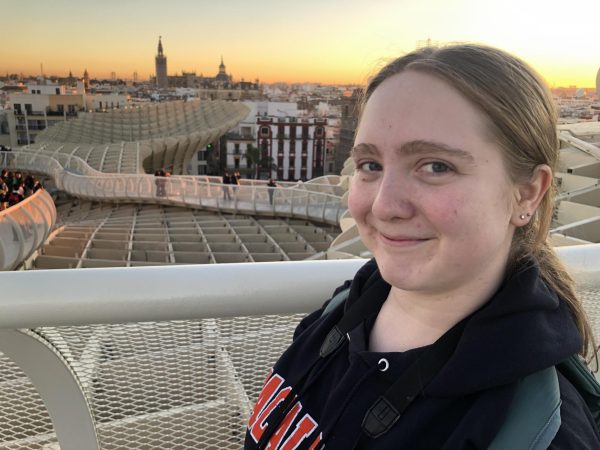Students and staff prep for study away

April 28, 2022
As we come to the end of another school year, many students begin to wonder, “what comes next?” For 134 students in the Fall of 2022, the answer is studying away and having new experiences in different countries.
Next year’s study away cohort consists of 30 international students. Additionally, following a pattern that emerged due to the pandemic, a large number of seniors will be joining other students in study abroad experiences.
Kevin Morrison, the Director of the Center for Study Away, said that the normal breakdown of students studying away is 94% juniors and 6% non-juniors. This year, however, there are significantly more seniors.
According to Morrison, the Center for Study Away is meant to support students throughout their study away experience and help them navigate the hurdles of traveling with COVID-19.
“I think the pandemic really took away a lot of folks’ sense of security in general,” Morrison said. “The number one word for study abroad is flexibility and that is truer today than it has ever been.”
Morrison said that the Study Away office keeps a close eye on COVID-19 rates. They use the method of risk measurement developed by the Center for Disease Control (CDC) which ranks countries on a scale of one through four, from low COVID risk to high COVID risk. The office uses the CDC measurements to determine which countries are safe for students to study in as well as to keep up to date on various border entry requirements which differ from country to country.
“All sorts of things can affect study away experiences,” Associate Director of Advising and International Student Support in the International Student Programs Office (ISP), Kara Warren, said. “We worked closely with study away to figure out [if international students] would come back to the US [at the beginning of the pandemic from their study away experiences].”
For students considering study away in the future, Morrison recommended looking at the study away offerings on their website and working with the Study Away office to find a program that suits them best. He said students should think about what is exciting to them about this opportunity and how it fits in with the rest of what they want to do during their time at Macalester.
Emma Squires ’24 is an environmental studies major who is intending to study abroad this coming Fall in Quito, Ecuador. Squires will be taking part in a program which will focus on ecology and conservation work. She said she was mostly drawn to the program because of the classes it offered and the immersion experience.
“I learned Spanish here and in high school, but all of my classes are going to be in Spanish and I’m living with a host family, which is a different way to learn that feels better, ” Squires said.
Andrea Vijil Morin ‘24 is an international student double majoring in psychology and anthropology with a community and global health concentration. She plans to study in Copenhagen, Denmark with a GIS-centered program.
“I’m interested in public health… To go to Scandinavia, that’s one of the gold standards,” Vijil Morin said. “I’m hoping that my classes will complement what I’ve done at Mac because a lot of them are things that are not offered at Macalester.”
Warren said that for international students, the study away process can be very different from that which domestic students experience in regards to what programs they have access to as well as financial aid rules. Warren said the ISP office is available to international students for one-on-one meetings about possible complications leading up to the study away experience. However, once the students arrive in the country where they’re studying, all communication must be done through the study away office and not through ISP.
Once international students are approved for study away, Study Away and ISP hold a joint session for the students about the unique hurdles they may confront in the study away process. Topics include visa management, communication with the host program about international student status, completion of US taxes and immigration procedures for leaving the US and then returning to the US for study away purposes.
“Every year we’ve done it, we’ve had 100% attendance of [international] students who are still planning to study away,” Warren said. “I do think that’s a testament to students’ rapport with our office and just familiarity with our staff”
Morrison said that financial aid barriers can also be a hurdle for international students hoping to study away. International students can only use their Macalester-based financial aid on Group A programs or they need to be majoring in a subject that requires study away that is not International Studies. Group A programs are described on the study away website as programs that are either Macalester faculty-led semester programs or exchange programs between Macalester and another university. Morrison said that he has been trying to change this rule since taking on his role in the Center for Study Away.
“I believe there’s some momentum to try to get that changed,” Morrison said. “I think the biggest challenge is that institutional change takes time.”
Vijil Moreno said she was initially worried about not having the proper funding. If things hadn’t lined up the way that they did, she wouldn’t be looking to the future of a semester away in Denmark.
“If my program had not had funding itself, I think that would have made it very difficult for me to actually go,” Vijil Morin said. “These [scholarships] are usually for US citizens, so that makes part of the difficulty of getting funding.”
For students looking to study away in the future, Squires recommended chatting with friends to discuss the right path as well as making sure students stay on top of the paperwork.
“Applying to study away can be as much work as applying for college,” said Squires.
Vijil Morin said that students should speak to advisors to find the right classes in a study abroad program as well as talk with people who have been through the program before to get a better idea of what the experience will look like.
“I’m sure everyone’s experiences are different, but having the review from a peer, I think it’s very important,” said Vijil Morin. “When you’re applying to a program, try to talk to people who have done it before.”













